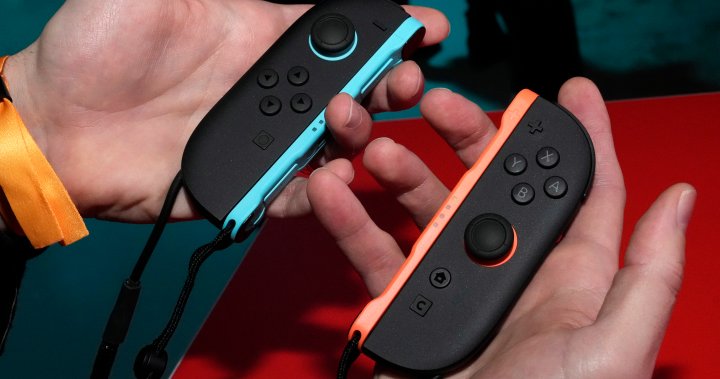The global video game industry is finding it hard to level up as U.S. President Donald Trump continues to escalate his global tariff war.
Retail experts say gaming giant Nintendo’s decision to pause pre-orders in the U.S. and Canada is an indication of the tough boss battles ahead for the gaming industry.
Nintendo said it is delaying the start of pre-orders for the Switch 2 gaming device in the United States as it examines the potential impact of tariffs, according to Reuters.
Pre-orders will not start on April 9 as planned in the U.S. “in order to assess the potential impact of tariffs and evolving market conditions,” Nintendo said in a statement.
The Switch 2 launch date of June 5 is unchanged, the company said.
The game maker is also delaying pre-orders in Canada, according to reports.
U.S. President Donald Trump has introduced sweeping tariffs on countries around the world, sparking a trade war that could affect the price of consumer goods.
Jeanel Alvarado, CEO of Edmonton-based retail strategy firm Retailboss, said, “Nintendo is playing a waiting game and crunching the numbers because these pre-orders, an order paid for in advance to be shipped out at a later date, didn’t take into account the new tariffs imposed by Trump this past week.”
This is not the first time Nintendo has been caught in the crosshairs of Trump’s trade policies.
In 2019, the company shifted some of the production of its Switch 1 console from China to Vietnam.
“Now the new tariffs are imposed on China and Vietnam, so if they ship out now they will be hit on both fronts,” Alvarado said.
She added that any impact on American gamers will also be felt north of the border, given the nature of the supply chain.
Get daily National news
Get the day’s top news, political, economic, and current affairs headlines, delivered to your inbox once a day.
For Canadian video game retailers, the tariffs might mean a compounded cost.
“Currently, Nintendo ships directly from Asia to the U.S. to fill pre-orders and then the rest of the shipment is sent by ground transportation to Canada. For Nintendo, this means they have to pay tariffs twice, once when its goods enter the U.S. from China, and again when goods cross the border from U.S. to Canada,” Alvarado said.
U.S.-based retail expert Eyal Elazar said console gamers will be hit harder than PC gamers.
“PC games may be less impacted due to digital download capabilities, however console games such as Mario Kart 8 are already being sold at higher prices, causing some disgruntled discourse within the gaming community,” he said.
It’s not just people buying a console now. Alvarado said even those looking to buy Nintendo games could have to shell out more cash.
“The costs of wholesale will rise for retailers looking to sell Nintendo games in stores and then in order to keep profitable margins the price of video games and game consoles will increase,” she said.
Alvarado added, “Nintendo, which authorizes other retailers to sell their games, more than likely will provide an increased MSRP (manufacturer suggested retail price), which is the price that a manufacturer recommends for a product to be sold to customers.”
Elazar said consumers who rely on e-commerce retailers, like Amazon and Temu, that deal with electronic goods imported from Asia will also feel the pressure from Trump’s tariffs.
“For retailers like Best Buy, which lead the consumer electronics sector, these challenges could trigger even higher prices in the coming months, especially for in-demand products like the Nintendo Switch 2, iPhone SE, and AirPods Pro 3,” he said.
Alvarado said if the tariffs are sustained, this could mean companies could start rolling back production with some products vanishing off the shelves for American and Canadian consumers.
“We can expect to see more delays, cutbacks or complete removal of products that aren’t in demand, as tech companies are betting only on higher margin items to offset tariffs,” she said.
–with files from Reuters
© 2025 Global News, a division of Corus Entertainment Inc.

